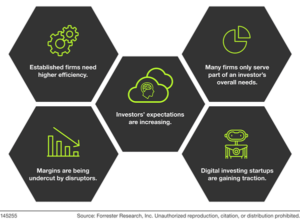Biometrics, Digital Decisioning, And APIs: These Are The Droids Investment Firms Are Looking For!
In “Star Wars,” Jedi Master Obi-Wan Kenobi uses a mind trick to convince the dreaded stormtroopers that the droids in his company are not the ones they are looking for, enabling him and his friends to safely move along. In our galaxy, there are no Jedi Masters to guide financial institutions as they choose from an increasing array of new digital technologies that are now at the core of a customer’s daily life when they manage their banking and investing activities.

Digital investing startups such as Betterment and Wealthsimple are undercutting established fund management business models and gaining traction with investors. And many of these propositions are mobile-first, including microinvestment manager Stash and stock trading app Robinhood. Aimed at digital-savvy Millennials, the common thread across these startups is that their apps are easy to use and provide less expensive services than the incumbents.
Historically, firms such as brokerages, fund management firms, and retirement fund providers have only served one slice of an investor’s overall financial situation, ignoring related areas like home ownership, tax, insurance, or estate planning. That has limited the opportunity to meet investors’ end-to-end needs. Leading firms are using these new digital technologies to help investors understand what they own, how they are doing, and what they should do — and then helping them do it.
Investment management firms are also under pressure to reduce operating expenses. The result? Digital business and technology management teams are streamlining and wringing costs out of processes such as investor onboarding and portfolio management through greater automation.
Today, forward-looking investment management firms are adopting these digital technologies to create easier account-opening experiences, provide holistic personal finance solutions, and offer lower fees to investors.
Consider The Following Use Cases Of Technologies That Are Optimizing The Digital Experience For Investors
- Biometric authentication and verification make interactions easier. UK private bank Coutts has introduced voiceprint technology that recognizes customers by the sound of their voice, eliminating the need for security questions and streamlining the authentication process during calls to the contact center. Similarly, Société Générale became the first bank in France to let new customers open an account with a selfie, eliminating the need to go to the branch. When a compliance and regulatory framework gets standardized for voice biometric authentication, I expect Alexa and Google to use investor voiceprints to eventually broker trades in a frictionless way.
- APIs enable new capabilities, a complete financial picture, and holistic advice. APIs enable firms to deliver contextually relevant products to investors, delivering better customer experiences built on a holistic view of an investor’s overall situation. Plaid is forming data-sharing agreements with banks such as Chase so that customers can share their information safely and quickly through a secure API rather than sharing user names and passwords, giving customers more control and visibility on how the data is being used. Plaid’s acquisition of rival Quovo, which specializes in investments and brokerage data, will enable it to create a more holistic financial picture for investors. Partnerships between different financial services providers will move toward an integrated digital ecosystem of finance, where data can flow in any direction. Timely, relevant messages about stocks owned, major withdrawals, and information on spending habits will be sent to customers with recommended actions.
- Digital decisioning software brings real-time personalization and action to investors. Envestnet Yodlee’s AI FinCheck uses machine learning to give customers insight into spending, saving, borrowing, and planning. By using predictive analytics and machine learning, insights are now dispensed in real time, with a focus on helping customers look ahead by providing alerts and recommendations on what to do next or even acting on behalf of the user. By 2022, leading wealth management firms will be doing the same, using digital decisioning software to make asset allocation, investment selection, and tax recommendations to investors. Investors will be able to bank, save and invest, monitor their financial goals, and receive intelligent advice from digital decisioning software through a single interface.
Investment management firms must continually understand established and emerging technologies and their potential impact. Read more in my latest report on my view of the five interconnected technologies benefiting investors and how they will eventually reshape investing, creating new business and operating models for investment management firms.
